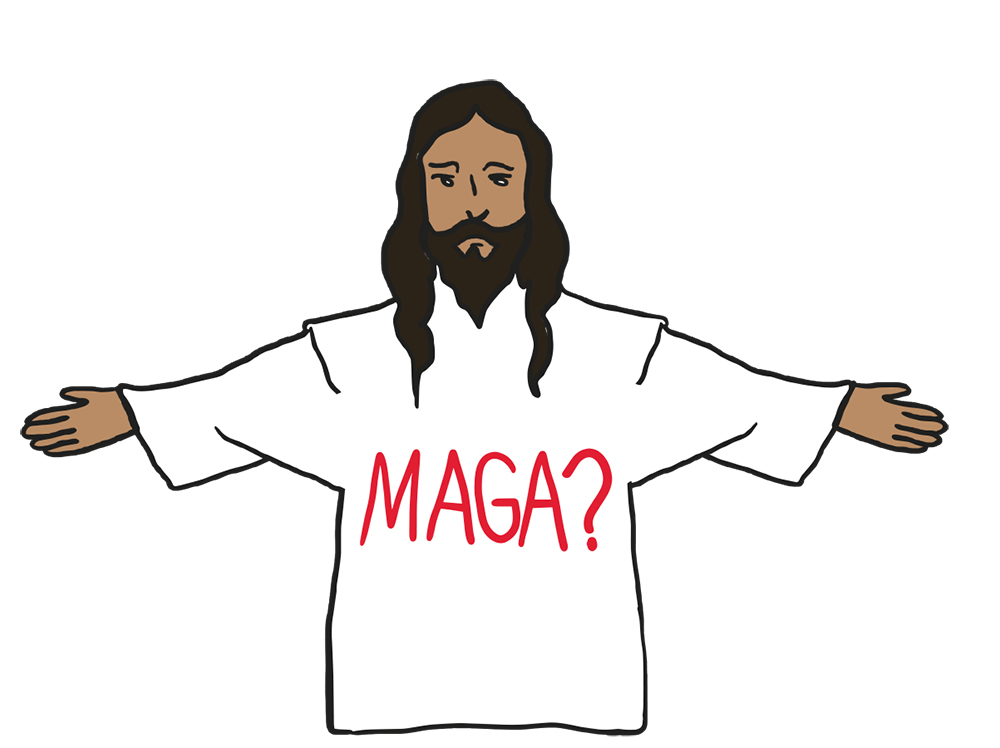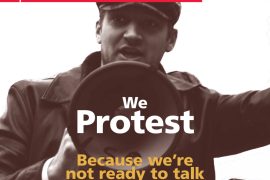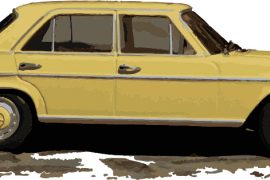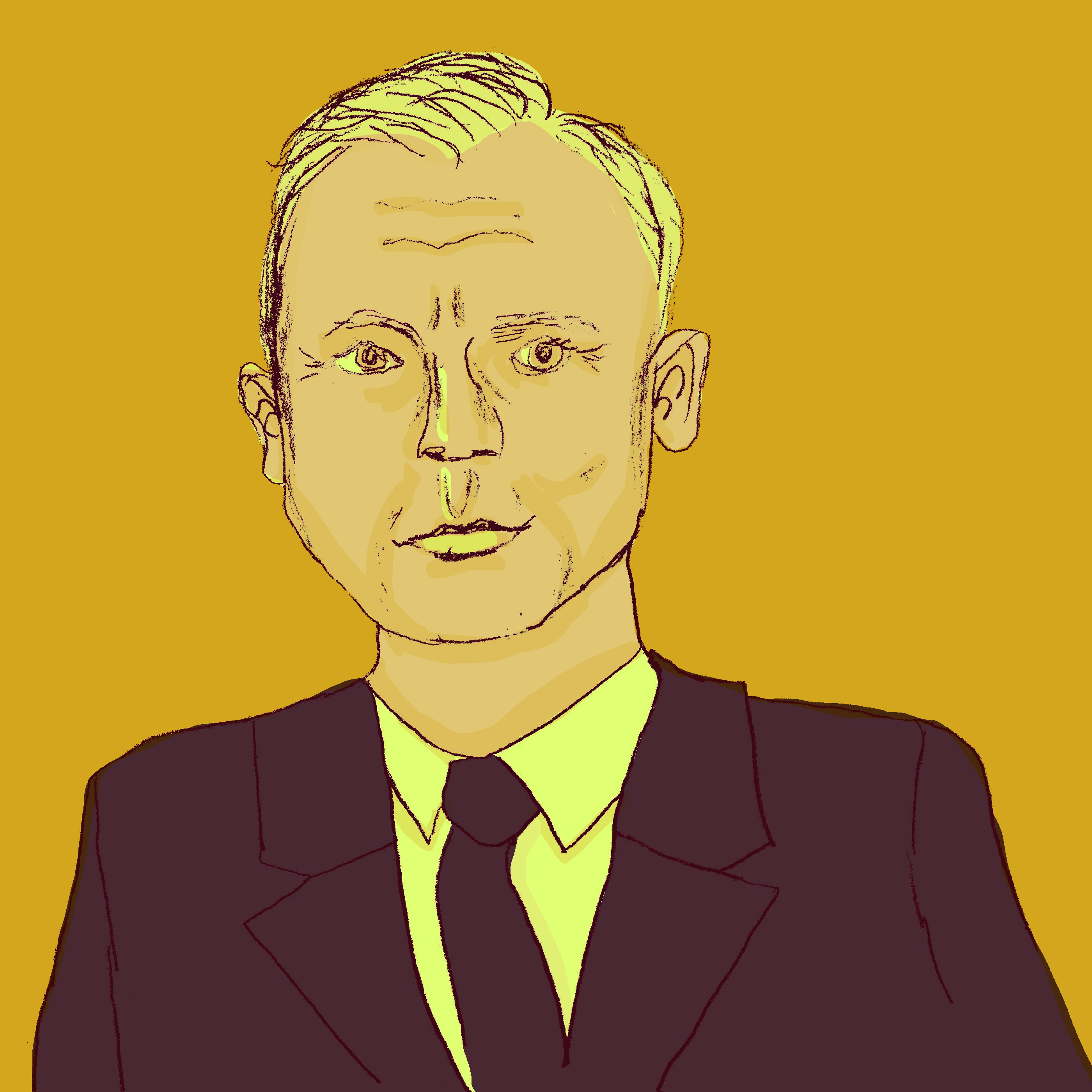On May 32nd, amidst great upheaval, wars and rumors of wars,1 and a plague that had beset all nations on the face of the earth, the candidates for the presidency of the United States of America came to that city set on a hill,2 where they met within a grand auditorium to debate their political platforms. The hall was filled with a great multitude which no one could count,3 so many thousands gathered together that they were stepping on one another,4 and upon the stage were three podia, one upon the left for the incumbent, one in the middle for the moderator, and one upon the right for the challenger. When the moderator raised his hand, a hush fell on that multitude and they beheld the entrance of the incumbent, the current President of the United States, as the moderator introduced him.
“Ronald ‘Big Ronny the Schmuck’ Schmuck is the current president, running with strong support from his own Publican Party as well as endorsements from the scribes, Pharisees, moneychangers, and lawyers. In a move without precedent, his campaign sought and secured the approbation and funding of foreign leaders of state: Pharaoh in Egypt; Nebuchadnezzar the King of Babylon; Tiberius Caesar; Herod the Great, King of Judaea; and Pontius Pilate, Governor of Judaea. His strongest supporter has been the Czar, whom the Schmuck has designated as his running mate and, to use the incumbent’s own words, ‘chief of all the important bureaus.’ Prior to his entrée into politics five years ago, Schmuck managed several casinos, a private university, golf resorts, and hotels, bankrupting all of them. He was also the star of a reality show, Apprentice of Mammon, and has a popular recurring role on professional wrestling television specials. Please welcome President Big Ronny Schmuck.”
The Schmuck looked out at the cheering crowd, staring like a cold-blooded lizard.
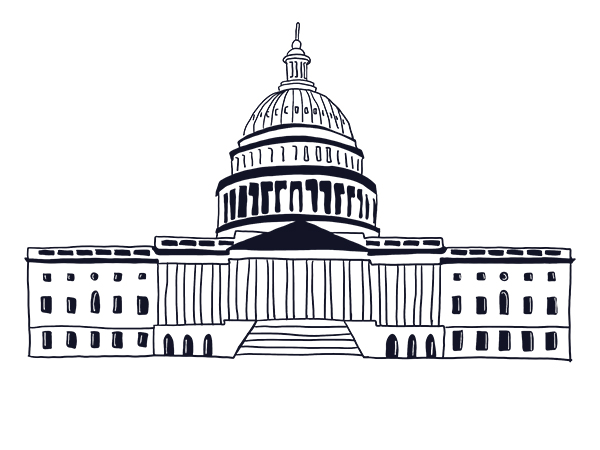
“This truly is an election year unlike any in American history,” the moderator continued. “Following threats against judges and athletes as well as every member of the opposition parties, there is only one other candidate this year, and he is running as an independent without the support of any party. Joshua Cohen was born in a stable in Bethlehem, Pennsylvania to unwed immigrant parents. For the last few years he has been a self-employed itinerant preacher, unaffiliated with any organized church, and a radical political activist and social organizer. Because of fear of reprisal from the Schmuck, no major political figure or organization backed Cohen, who instead runs with a dozen endorsements from illiterate immigrant fishermen and carpenters, a former tax collector, some minorities on medical disability, and additional campaign support from his mother and some poor women alleged to be former prostitutes. Please welcome Joshua Cohen.”
Cohen, wearing a threadbare robe and worn sandals, entered. Disorderly people in the audience, wearing red hats with the mark of the Schmuck, leapt on the stage. They spit in his face, and buffeted him and smote him with the palms of their hands.5 Security guards subdued the attackers and escorted them offstage, even as they continued to shout and berate Cohen.
“What a loser this Cohen guy is, right?” the Schmuck asked. “Do Americans want a wimp like that, or do they want a winner? Do they want some work-shirking Jew, or do they want the biggest Schmuck and most devout Christian there is?” Those among the multitude wearing red hats, hats marking their submission to the Schmuck and his works, roared in approval. The Schmuck twisted his face, stretching the ends of his mouth upward.
Cohen wiped the spittle from his face and spoke into the microphone at his podium: “A prophet is not without honor, but in his own country, and among his own kin, and in his own house.”6
The moderator gestured for silence. “The issue foremost on Americans’ minds this election season is healthcare. Can each of you describe your position on healthcare reform?”
Cohen was leaning forward to speak when the Schmuck barked, “I go first! I always get to go first!” His opponent gestured for him to continue.
“I know a lot about health and doctoring, and lots of people are talking about how much I know about those things. I think, more than ever, it’s apparent how much I know about health, and most Americans—most patriots—would agree that I know a lot of things and everyone says so.” The Schmuck rocked back on his heels and screwed up the flaps of his face.
“If you please, Mr. Schmuck,” the moderator said, “answer the question concisely without resorting to recursive meanderings.”
The Schmuck jerked his head and derisively flicked out his tongue. “I didn’t go to an Ivy League school to use big, un-American words, but I’ll answer the question. People should not get sick—if people get sick, they can’t work, and that’s bad for the economy. We want our people to work, we want to make money. America is a business, not a charity case for bozos who want to get sick all the time.”
“How do you respond, Mr. Cohen?”
“They that are whole have no need of the physician, but they that are sick.7 Cure those who have need of healing.”8 And he expounded upon the pro bono medical work he had been performing for the uninsured, the impoverished, and the unfortunate, simultaneous with his preaching and activism. The people were astonished at his doctrine;9 then opened he their understanding.10
The Schmuck scoffed. “Healing a bunch of lazy layabouts who probably crossed the border illegally is not my idea of health for Americans. Most of them, I don’t know how many, but I think we all know how many, are bad hombres and rapists and killers who are a danger to our women and our country. In my next term, after this election nonsense, I’ll see to it that this kind of subversive activity stops at once.”
“Let’s move on to the next point of debate,” the moderator said. “The other issue that concerns voters—”
The Schmuck coughed at the word “voters.”
“—in this election is income inequality. Mr. Schmuck, would you like to talk about your views on this?”
“Please, call me The Schmuck—I’m one of a kind.” And it was true, for he was unlike other men, like unto nothing so much as a serpent that crawls on its belly and devours the harvest before its time. “I don’t think there’s such a thing as inequality in this country. If people spent less time complaining and more time working, they’d all be successful, instead of a bunch of losers, which is what they are. Anyone can start at the bottom and work his way up; just look at me: using all the businessman skills that I wrote about in How to Steal, I turned the gazillions I inherited from my father into millions.”
“Gazillion isn’t a number,” the moderator said, “and when used colloquially, it usually indicates a number larger than a billion.”
“Whatever. The bigger one, I meant the bigger one,” the Schmuck barked while shaking his head. “You college types are so fussy with your little words and your little definitions. Whose opinion matters anyway: someone who uses big words or someone like me who’s a celebrity? I answered the question, now talk to that loser in a robe.” He wagged his finger in Cohen’s direction.
Cohen stepped up to his microphone and spoke in a commanding voice. “Take heed, and beware of covetousness: for a man’s life consisteth not in the abundance of things which he possesseth.11 Lay not up for yourselves treasures upon earth.12 Sell all that thou hast, and distribute unto the poor.13 For we also forgive every one that is indebted to us.14 If a son shall ask bread of any of you that is a father, will he give him a stone? Or if he ask a fish, will he for a fish give him a serpent? Or if he ask an egg, will he offer him a scorpion?15 Ask, and it shall be given you.16 For every one that asketh receiveth.”17
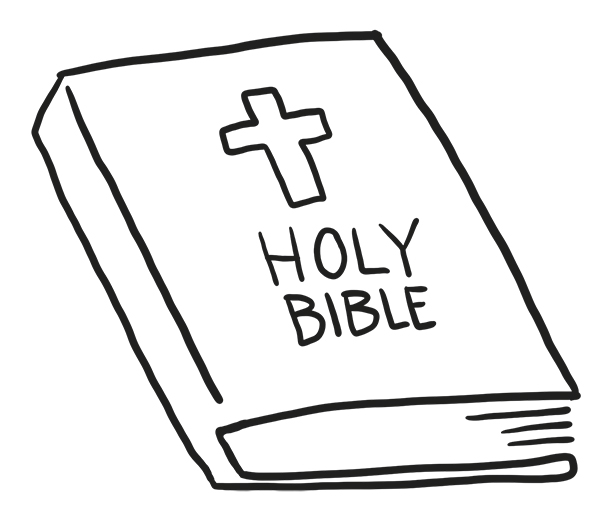
The Schmuck scoffed. “That sounds like a bunch of communist bullshit from some shithole country nobody’s ever heard of, and that nobody wants to hear from, and that nobody should hear from. What this country needs is good, old fashioned Christianity, not a bleeding heart agenda. Where are we going to get the money to pay for that? A trillion here and there for a stock market infusion, five or six hundred billion for the military—the heroes, the men and women my campaign supports—sure; this liberal gobbledygook about forgiving debts and giving handouts to losers—I don’t buy it, not one bit.”
“Beware of false prophets, which come to you in sheep’s clothing, but inwardly they are ravening wolves,”18 Cohen said. “Ye blind guides, which strain at a gnat and swallow a camel.19 For they bind heavy burdens and grievous to be borne, and lay them on men’s shoulders, but they themselves will not move them with one of their fingers.20 They devour widows’ houses and for a pretense make long prayers.”21
“Very interesting response, Mr. Cohen,” said the moderator. “Our country’s military is currently involved in seven armed conflicts. What are your respective positions on the American military?”
“I support our military in everything,” The Schmuck said. “If a general or major or whoever asks me for something, I provide it because that’s what a president should do. I’m not a veteran, although I’d like to think that I heroically overcame my bone spurs the way our heroes in uniform triumph over our enemies every day. So, you ask me what I think of the military, I’ll tell you: they’re great, they’re terrific, every one of them is terrific and tremendous, and we can’t wait to get this election over and give them more money to go win for America.” He stretched the ends of his mouth across his face and squinted. A sea of red hats surged, cheering and shouting, as the light in the auditorium caught the marks upon the hats.
Cohen raised his arms as if to embrace the entire crowd, even those in the red hats scorning and mocking him as he spoke.“Blessed are the merciful: for they shall obtain mercy.22 Blessed are the peacemakers. All they that take the sword shall perish with the sword.”23
The Schmuck inhaled to begin a tirade, but the moderator raised his hand to stop him. The Schmuck stamped his foot and huffed.
The moderator looked at each candidate in turn. “Now the two of you will take turns summarizing your respective platforms in a brief phrase or sentence. Schmuck, you may begin.”
“That’s right; schmucks always come first.” He leered at the crowd through the narrow slits in his face. “My phrase is this: a bigly wall, the bigliest wall in the history of big walls.”
“A mustard seed, which indeed is the least of all seeds.”24
“Bomb the shit out of them.”
“And as ye would have that men should do to you, do ye to them likewise.”25
“Alternative facts.”
“Forgive us our debts.”26
“Grab them by the pussy.”
“Consider the lilies of the field, how they grow; they toil not, neither do they spin.”27
“Christian—we’re true Christians, not entitled socialist dirtbags like this guy,” the Schmuck said smugly as he held up his right hand to display the mark there. And those in the audience wearing red hats did likewise, for these marks were put upon the fronts of caps and upon the right hands of the people of this nation in a show of allegiance to the Schmuck that they might buy and sell with the money of blood in his market.28
“He who hath ears to hear, let him hear,”29 Cohen said. He then upended the podium and rebuked them: “This is an evil generation.30 O generation of vipers,31 this people draw nigh unto me with their mouth, and honoureth me with their lips; but their heart is far from me. They teach for doctrines the commandments of wicked men.”32
The Schmuck went red in the face and slithered in his suit, hissing through the orifice in his jaundiced face. As he did so, the lights in the auditorium flickered and went out; there was darkness over the multitude, darkness that could be felt.33 Without amplification or lighting, the Schmuck screamed into the darkness at the multitude, using much profanity. “What have I to do with thee, Joshua? I adjure thee.34 I will divide this house and this nation, which shall not stand. My name is Legion: for we are many.”35 A bitterly cold wind seemed to move through the auditorium and there was weeping and gnashing of teeth36 as the Schmuck continued howling in the darkness.
Cohen raised his voice above the cacophony, as one crying in the wilderness.37 “Get thee behind me, Schmuck; thou art an offence unto me, thou unclean spirit, for thou savourest the things that be of wicked men.38 For by thy words thou shalt be condemned.”39 The people which stood in darkness saw great light40 as the power came back on in the auditorium. “O faithless generation, how long shall I be with you? How long shall I suffer you?41 How is it that ye do not understand?42 Having eyes, see ye not? And having ears, hear ye not? And do ye not remember?43 Judge not, that ye be not judged.44 Love your enemies.45 Thou shalt love thy neighbor as thyself.”46
But the crowd knew him not, and he marveled at their unbelief.47
The moderator cleared his throat. “Thank you, gentlemen. This was quite a debate, and now it’s time to close out the evening.”
Cohen locked eyes with the Schmuck and spoke to him: “Depart from me, ye workers of iniquity48 for ye have made the White House into a den of thieves.”49 The Schmuck looked away and mugged for the crowd with his loose, slimy face; he raised his prehensile appendages and made signs to the crowd. “Rise up, let us go; lo, he that betrayeth me is at hand,”50 Cohen said to himself as he watched the Schmuck raise his right forelimb in salute, a salute that those bearing the mark returned as they chanted menacingly in foreign tongues. And the Schmuck, the vile one who stood upon the left side of the stage, walked the left-hand path off the stage. And Cohen, who had stood upon the right-hand side of the stage, walked the right-hand path as those in the audience wearing red caps with the mark of the Schmuck did mock him as he went.
And so it was that Joshua Cohen, radical preacher and activist, confronted the Schmuck, the ruler in those days of iniquity, and spoke parables unto him and unto the multitude. Yet it was not known until the day of election whether the people of that nation heeded the wisdom of Cohen or bowed before the wickedness of the Schmuck.
- Matthew 24:6
- Matthew 5:14
- Revelation 7:9
- Luke 12:1
- Matthew 26:67
- Mark 6:4
- Mark 2:17
- Luke 9:11
- Matthew 7:28
- Luke 24:45
- Luke 12:15
- Matthew 6:19
- Luke 18:22
- Luke 11:4
- Luke 11:11
- Luke 11:9
- Luke 11:10
- Matthew 7:15
- Matthew 23:24
- Matthew 23:4
- Mark 12:40
- Matthew 5:7, substituted “Joshua” for “Jesus” and cut “Son of the most high God”
- Matthew 26:52
- Matthew 13:31–32 (paraphrased)
- Luke 6:31
- Matthew 6:12
- Matthew 6:28
- Revelation 13 (adapted), Matthew 27:6
- Matthew 13:9
- Luke 11:29
- Matthew 12:34
- Matthew 15:8
- Exodus 10:21 adapted
- Mark 5:7
- Mark 5:9
- Matthew 7:12
- Mark 1:3
- Matthew 16:23 (adapted), Mark 5:8
- Matthew 12:37
- Matthew 4:16 adapted “stood” for “sat”
- Mark 9:19
- Mark 8:21
- Mark 8:18
- Matthew 7:1
- Matthew 5:44
- Mark 12:31
- Mark 6:6
- Luke 13:27
- Luke 19:46 (adapted “the White House” for the pronoun “it”)
- Mark 14:42

